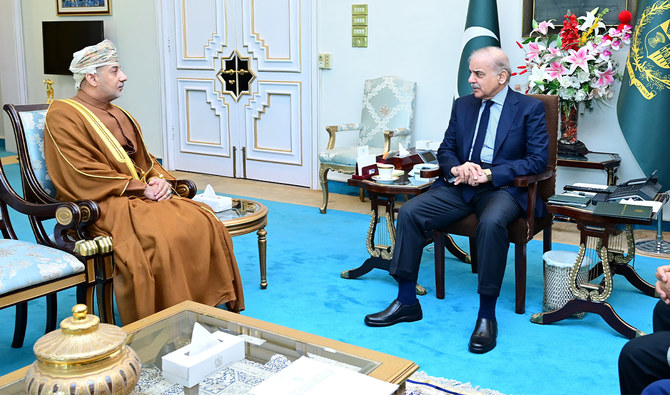ISLAMABAD: Prime Minister Shehbaz Sharif on Friday offered Pakistan’s support to Oman after a mosque attack in Muscat killed six people, including four Pakistanis, and injured dozens of others this week, Sharif's office said.
The statement came after Sharif's meeting with Omani Ambassador Fahad Sulaiman Khalaf Al-Kharusi that followed the arrival of bodies of Pakistanis who were killed in Monday's attack claimed by the Daesh militant group.
The attack unfolded as three gunmen, all brothers and of Omani nationality, opened fire on worshippers at a Shia Muslim mosque. Two others killed in the attack included an Indian and a police officer who responded to the attack.
"The Prime Minister strongly condemned the dastardly terrorist attack on Imam Bargah Ali bin Abu Talib in Wadi Kabir district of Muscat, which resulted in the death of six people, including four Pakistani nationals and over thirty injured, nearly all of whom were Pakistanis," Sharif's office said in a statement.
"While appreciating Oman’s swift response and cooperation with the Pakistan Mission in repatriation of the dead bodies and treatment of the injured, the Prime Minister said Pakistan had itself been the victim of terrorism for the past several decades. He offered Pakistan’s support to Oman in dealing with the menace of terrorism, which must be eliminated in all its forms."
The statement came hours after bodies of the four Pakistani nationals killed in the Muscat mosque attack were brought back home by the Pakistan International Airlines (PIA) and handed over to their families.
Monday evening marked the beginning of Ashura, an annual period of mourning marked by Shia Muslims to commemorate the 7th-century death of Imam Hussain, a grandson of the Prophet Muhammad (peace be upon him).
Daesh’s operations have indicated the group is attempting a comeback after it was crushed by a US-led coalition following its occupation of large swathes of territory in Iraq and Syria and declared a caliphate. It also inspired lone-wolf attacks in the West.
Any inroads in Gulf Arab oil producers such as Oman would raise fears in Washington and the region which has long viewed militant groups as a major threat.
TRADE AND INVESTMENT
During the meeting, the prime minister conveyed his good wishes for Sultan Haitham bin Tariq and reiterated his invitation to the Omani leader to undertake an official visit to Pakistan at his earliest convenience, according to the statement.
He expressed Pakistan’s desire to further strengthen bilateral cooperation between the two countries, particularly in trade, investment, energy and defense.
"The Prime Minister thanked the Ambassador for encouraging a trade and investment delegation to undertake a visit to Pakistan next week, while assuring him that the concerned authorities would extend full cooperation to the delegation while seeking mutually beneficial outcomes," Sharif's office said.
"The Ambassador thanked the Prime Minister for receiving him and conveyed the greetings of His Majesty the Sultan of Oman. He reaffirmed his country's desire to further enhance its trade and investment relations with Pakistan."
Pakistan, which narrowly escaped a default last year, is currently navigating a tricky path to economic recovery. The South Asian country recently reached a staff-level agreement with the International Monetary Fund (IMF) for a $7 billion loan.
Apart from IMF deal, Islamabad has high-level exchanges with several countries, particularly the Gulf states, in a bid to boost trade and foreign investment in the country to support the $350 billion South Asian economy.











